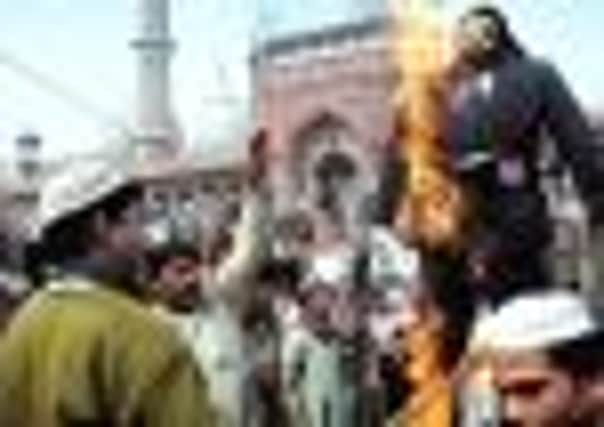Book review: Joseph Anton: A Memoir, by Salman Rushdie


Joseph Anton: A Memoir
Salman Rushdie
Jonathan Cape, £25
TOWARDS the end of this memoir, Rushdie writes: “In the pages of a novel it was clear that the human self was heterogeneous, not homogenous, not one thing, but many, multiple, fractured and contradictory”.
It is one of the book’s merits that it achieves in non-fiction what he here claims for fiction.
Advertisement
Hide AdAdvertisement
Hide AdHe was not just “Joseph Anton” – the pseudonym he took from the first names of Conrad and Chekhov – but became fissured between father, lover, and friend “Salman” and the hood-eyed, Mephistopheles-bearded Rushdie both burnt in effigy and excoriated in the press for his ungratefulness. Perhaps more interestingly, his father had changed his name from Dehlavi to Rushdie in honour of Ibn Rushd, the 12th century liberal polymath better known in the West as Averroes.
It is a curious and compelling book, equal parts bravery and bravado. There are Rushdie-esque riffs that no-one but he could have penned. Rushdie writes the book in the third person. At some points, this use of “he” very effectively conveys the “this can’t be happening to me” feeling of having one’s life turned upside down. In later sections, it takes on the preening quality one associates with Caesar writing his memoirs in the third person. For every moment that I was moved, challenged and intrigued by the book, there was another – such as his relief at being in America, which allowed him to be among “normal literary folk going about their normal business”, usually accompanied by a litany like “a small circle of guests whose other members were Martin Amis, Martin Scorsese, David Bowie, Iman, Harrison Ford, Calista Flockhart and Jerry Seinfeld” – that was wince-worthy.
Before the publication of The Satanic Verses, Rushdie worried about being criticised over certain autobiographically nuanced elements, rather than the “insult” to religion. “Was it wrong, ghoulish, vampiric?” he muses, to be inspired by his father’s death. He expected his circumstances to change dramatically, but because his relationship with Marianne Wiggins (described here as a compulsive liar and suffering from artistic jealousy) was foundering. Then Khomeini took the unread interpretation of the novel in a staggeringly different direction.
Rushdie opens his memoir with a description of the scene from The Birds where the first blackbird lands on the climbing frame: in itself unexceptional until the birds accumulate into a throng (I feel obliged to point out they are actually crows).
As with Kenan Malik’s From Fatwa To Jihad, the “Satanic Verses Affair” is an overture to 9/11. Rushdie writes: “Before anyone else was interested in the ornithology of terror he saw the gathering birds. He would be a Cassandra for his own time… no, not Cassandra, that wasn’t right, for he was not a prophet. He was just listening in the right direction, towards the advancing storm”.
This is, I feel, a slight distortion. The Satanic Verses may have put angry Muslims on the streets in Bolton and Bradford as well as Tehran and Bombay, but the history of terror between the West and Islamic countries was already well under way: the Libyan embassy siege, the killing of Alec Collett, the kidnapping of Waite, McCarthy and Keenan. Three months after the publication of The Satanic Verses – which begins with Farishta and Chamcha falling from an exploding plane, Pan Am Flight 103 exploded over Lockerbie. Throughout the book, Rushdie can be self-lacerating, self-mocking, self-pitying and self-important (and the honesty in these matters is crucial to the book’s fascination); he is never knowingly self-deprecating.
Rushdie attacks the liberals who cried “Islamophobia” and tellingly compares Islam to Marxism. “But just as when the USSR collapsed, and it became clear that ‘actually existing Socialism’ had fatally polluted Marxism in the eyes of all those who helped bring the despots down, it was no longer possible to believe in a True Faith untainted by the crimes of the real world”. The Islamophobia of Robert Kilroy-Silk or Nick Griffin seems a prejudice radically different from the critical comments on Islam made by Houellebecq or Christopher Hitchens. Rushdie’s idea of himself as a “secular Muslim” seems more open; and it is striking that while “secular Jew” has passed into common parlance, “secular Muslim” has not.
Advertisement
Hide AdAdvertisement
Hide AdAmid the serious stuff there is a toothsome amount of first-rate literary gossip. Who knew that John Irving’s home was decorated with framed examples of his topping the New York Times bestseller list – even one where Salman Rushdie knocked him into second place? There is a laugh out loud anecdote, involving Harold Pinter, who faxed friends his latest poems and then expected prompt praise. One such verse, on the cricketer Len Hutton, ran “I saw Len Hutton in his prime/Another time/Another time”. When Pinter phoned the playwright Simon Gray for his praise, Gray replied: “I’m sorry, Harold, I haven’t had time to read it”.
It is noticeable that Rushdie’s post-The Satanic Verses career has been uneven: all dazzle and little grit. As with Amis’s Experience, this non-fiction is Rushdie’s best book in a decade. I hope it presages a renaissance in his novel-writing.